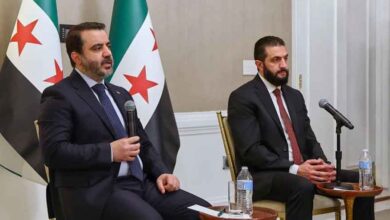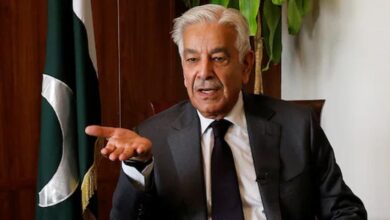Federal Minister for Information and Broadcasting Attaullah Tarar said on Saturday that the report published in The Economist had removed a lid from the fact that PTI founder Imran Khan’s wife Bushra Bibi had a lot of influence on decision-making when her husband was the country’s prime minister.
Speaking to reporters after appearing in Judicial Complex in Lahore for cross-examination in a defamation suit filed by Prime Minister Shehbaz Sharif against Imran, he said that it was Bushra who would take all decisions whether related to the country’s economy or politics. “Bushra, who to Imran was a spiritual person, had a lot of influence on him,” Tarar said, adding, “The former prime minister would take decisions after consulting his wife, and not experts.”
The minister further said that the PTI founder levelled a baseless allegation against PM Shehbaz during the party’s sit in in 2014 that the latter had offered him Rs10 billion through a common friend in exchange for withdrawing from the Panama Papers case, which was then pending before the Supreme Court. “Whenever Imran spoke, he would lie,” Tarar said.
He praised Pakistan Army for successfully completing operation against militants at Cadet College WANA. “As many as 550 cadets were rescued,” he said.
Criticizing the KP government, the minister said that not a single project could be completed in the province during the last 12 years.
Bushra Bibi influenced Imran’s decisions: Economist
Bushra Bibi exerted significant influence over critical government decisions and high-profile appointments during the tenure of PTI founder Imran Khan as prime minister, said a report published in The Economist, authored by Owen Bennett-Jones.
Sources close to Imran Khan’s inner circle claimed that Bushra Bibi played a substantial role in shaping governmental choices, with many alleging that her spiritual influence over Khan led to a perception that his decision-making process had been overshadowed by her guidance.
The report further revealed that Khan’s ability to make decisions, including flying in his official plane, was said to depend on Bushra Bibi’s approval, highlighting the degree of control she may have exerted.
The magazine also suggested that sensitive information from certain elements within Pakistan’s security agencies may have been funnelled to Bushra Bibi, who presented it as insights gained through her “spiritual intuition” before passing it on to her husband.
The report also claimed that Imran Khan married Bushra Bibi, a spiritual guide, in a bid to secure power, with Bushra reportedly telling him that their marriage would pave the way for him to become the prime minister.
Her role, according to the magazine, extended far beyond personal matters, involving what many referred to as ‘spiritual guidance’ that greatly impacted Khan’s political agenda.
Additionally, the report addressed the political evolution of Imran Khan, detailing his rise from cricketing fame to establishing his political party, Pakistan Tehreek-e-Insaf (PTI), on the promise of eliminating corruption. The report highlighted his opposition to the then-prime minister Nawaz Sharif, including protests in 2014, and his allegations of corruption against Sharif, leading to a prolonged political struggle.
In terms of his personal life, the report covered Khan’s divorce from his second wife, Reham Khan, and how he was introduced to Bushra Bibi through his acquaintance.
The influence of Bushra Bibi, a former married woman, on Khan’s decisions became more pronounced, as it was reported that she held sway over his political choices and governance.
Employees of Bushra Bibi revealed that she had a penchant for performing spiritual rituals, often involving meat offerings and other traditional practices. Bushra Bibi was also said to have an influence on Khan’s decisions regarding state affairs, including appointments and schedules, with some even claiming that his plane could not take off without her approval.
The report also uncovered that Bushra Bibi’s influence extended to matters involving senior officials like former army chief General Qamar Javed Bajwa, with claims that she was present during crucial one-on-one meetings and often took charge of discussions.
Amid these revelations, the magazine touched on allegations of corruption involving Bushra Bibi, which were said to have led to the removal of key officials, including the Director-General of ISI. The political promises made by Khan during his campaign, including his vision for a just Islamic state and good governance, were contrasted with his struggles to deliver on those promises once in power.










